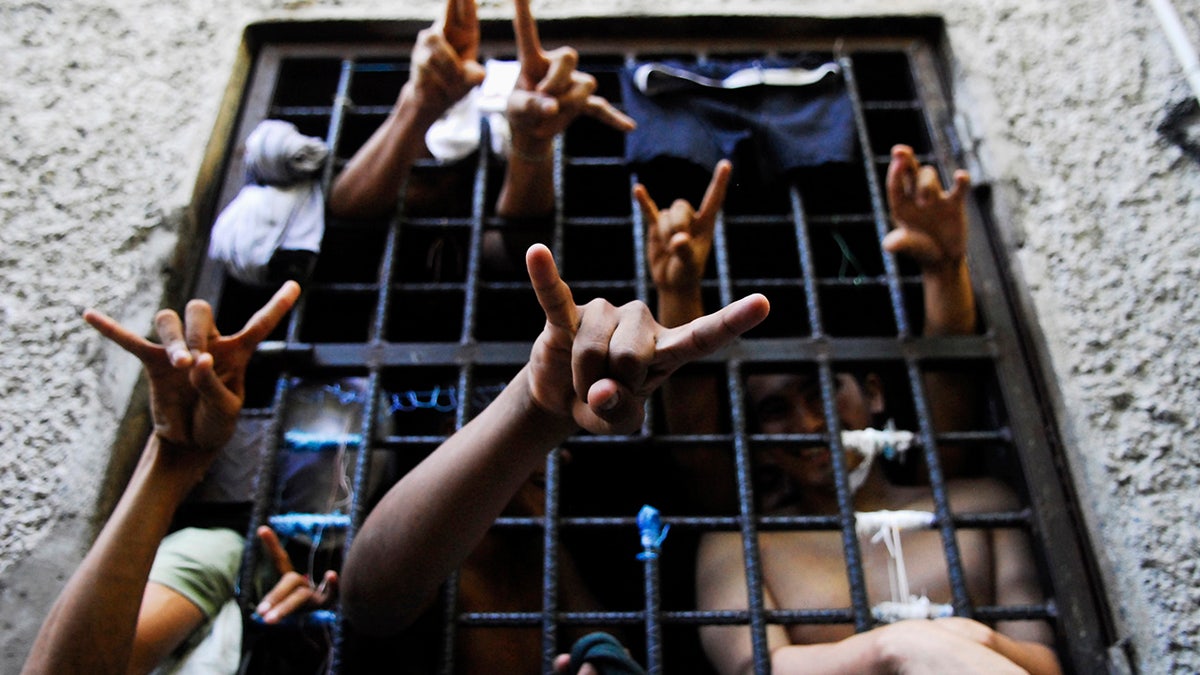
MS-13, or the Mara Salvatrucha, is believed by federal prosecutors to have thousands of members nationwide.
A Toronto man scheduled to be kicked out of Canada for being a member of MS-13 has asked officials not to deport him because his skull, knuckle and body tattoos could cost him his life in his native El Salvador.
René Pacheco was granted a temporary reprieve after successfully arguing that his tattoos would make him the target of rival gangs and law enforcement officials in the small Central American country.
Pacheco is a permanent resident in Canada and has not lived in El Salvador for 20 years but is not a Canadian citizen.
The 25-year-old, who goes by the nickname “Machete,” was arrested in 2016 on a number of criminal charges. While in custody and awaiting trial, Canada Border Services Agency officers interviewed him.
DOZENS OF MS-13 GANG MEMBERS CHARGED FOLLOWING DRUG, MURDER PROBE, U.S. ATTORNEY SAYS
It was during that meeting, the National Post first reported, that Pacheco allegedly bragged to agents about his ties to the notorious gang. MS-13, short for La Mara Salvatrucha, is primarily composed of immigrants and descendants from El Salvador and is widely known for their extreme brutality.
Pacheco allegedly showed officers a tattoo of the number 13 on the back of his hand, a teardrop inking on his face as well as a number of other permanent markings on his body. He told agents he was initiated into the gang by surviving a 13-second beating. His Facebook page even featured gang graffiti and signs.
Pacheco’s story was believable enough for officers to order his deportation for being a member of a criminal organization. But he then changed his story and denied all ties to the gang.
“I made a bad decision getting these tattoos not knowing it was going to relate to this,” Pacheco said at an immigration hearing in 2017.
MOM HONORED BY TRUMP AFTER MS-13 KILLED HER DAUGHTER IS STRUCK, KILLED BY SUV NEAR MEMORIAL SITE
He claimed the number 13 tattooed on him was merely his “lucky number” and said the teardrop on his face was a tribute to his father who was murdered in El Salvador. Pacheco also claimed he learned about MS-13 by watching YouTube videos and said he was on drugs when he spoke to CBSA agents from his jail cell.
“I am not a member,” he said. “I made a mistake… Innocent people are dying back in my country and here I am getting these tattoos thinking it’s a joke not realizing the consequences that it brings.”
A federal court judge didn’t buy his reversal and upheld his deportation sentence.
Running out of time, Pacheo applied for a Pre-Removal Risk Assessment, a last-ditch effort to remain in the country.
“I understand that if someone arrives in El Salvador with tattoos and they think they are in a gang they can kill them, torture them or immediately throw them in prison,” he said in his appeal. “I can be the target of gangs there for trying to impersonate them. Therefore my life is in danger and I have no hope of being protected.”
His petition was denied.
MS-13 MEMBER IN VIRGINIA PLEADS GUILTY TO MURDER FOR HACKING MAN TO DEATH WITH MACHETE
He appealed the decision to a federal court and was granted a temporary stay. Judge E. Susan Elliott noted that Pacheo’s tattoos were a catalyst for a perceived risk and ordered a new assessment by a different officer.
In coming to her decision, Elliott noted a U.S. Department of State report that highlighted the “arbitrary deprivation of life” gang members face by authorities.
“This was particularly important as he would be returned to El Salvador for being a member of the MS-13 gang, despite his post-interview denials of such membership,” she wrote in her decision.




















